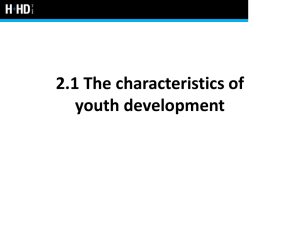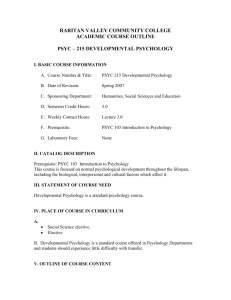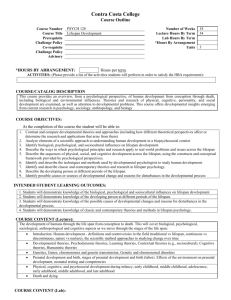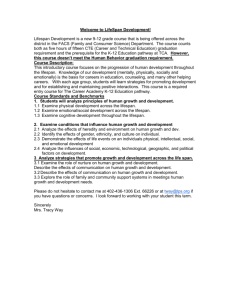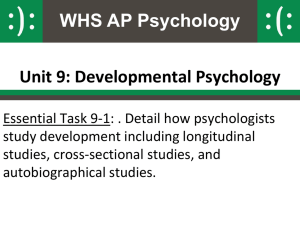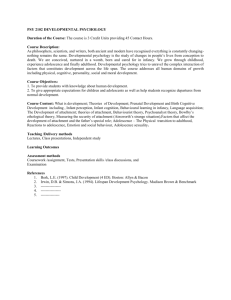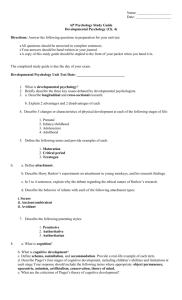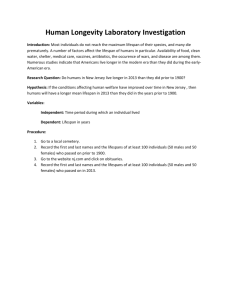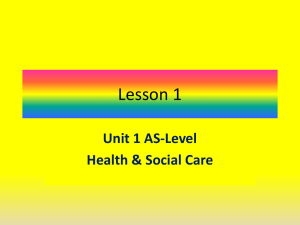PSY120 - Lifespan Development F15
advertisement
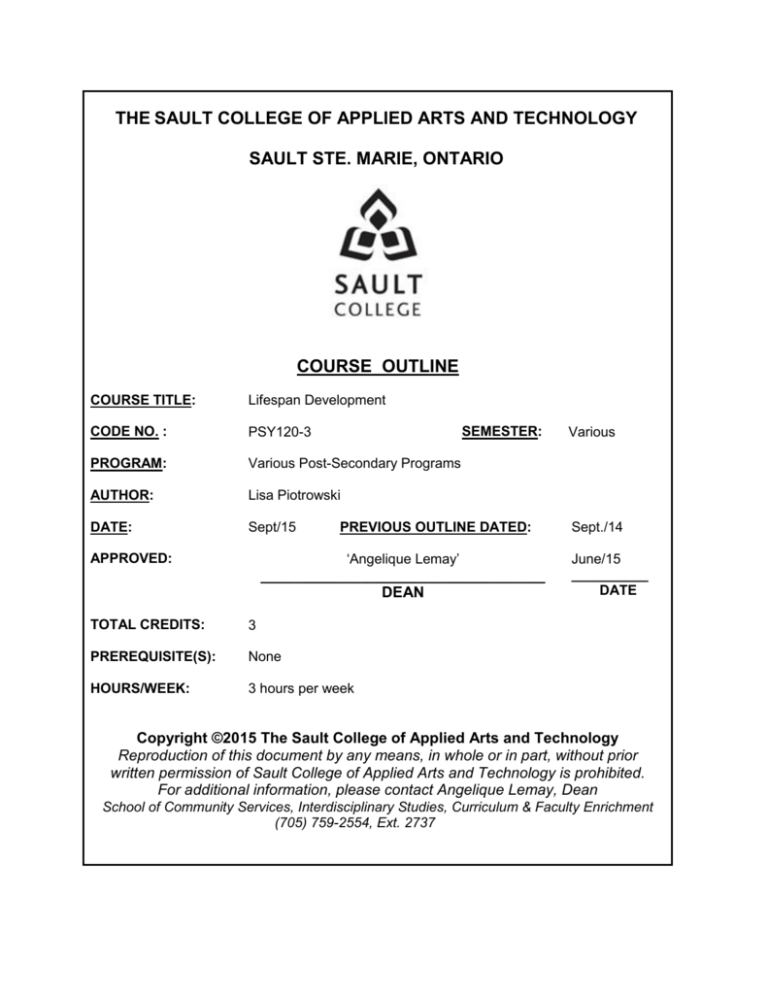
THE SAULT COLLEGE OF APPLIED ARTS AND TECHNOLOGY SAULT STE. MARIE, ONTARIO COURSE OUTLINE COURSE TITLE: Lifespan Development CODE NO. : PSY120-3 PROGRAM: Various Post-Secondary Programs AUTHOR: Lisa Piotrowski DATE: Sept/15 SEMESTER: PREVIOUS OUTLINE DATED: ‘Angelique Lemay’ APPROVED: __________________________________ DEAN TOTAL CREDITS: 3 PREREQUISITE(S): None HOURS/WEEK: 3 hours per week Various Sept./14 June/15 __________ DATE Copyright ©2015 The Sault College of Applied Arts and Technology Reproduction of this document by any means, in whole or in part, without prior written permission of Sault College of Applied Arts and Technology is prohibited. For additional information, please contact Angelique Lemay, Dean School of Community Services, Interdisciplinary Studies, Curriculum & Faculty Enrichment (705) 759-2554, Ext. 2737 Lifespan Development I. 2 PSY120-3 COURSE DESCRIPTION: Developmental psychology is the study of the processes that shape human development. Development includes the systematic changes and continuities that occur in people from conception to death. The goals of studying life span development are description, explanation and optimization of human development. In this course, the interrelationship of psychological, cognitive and psychosocial development will help inform understanding of the whole being. Nature – Nurture, one of the central issues in the study of development, helps one to understand the interaction between cultural, social and historical impacts and biological maturation. This major issue will be highlighted throughout the course as a reference point for the holistic understanding of human development. In addition, to studying human development in a systematic way, students will gain a personal understanding of their own lives in the context of lifespan development. II. LEARNING OUTCOMES AND ELEMENTS OF THE PERFORMANCE: Upon successful completion of this course, the student will demonstrate the ability to: 1. Demonstrate familiarity with the main concepts, issues, evolution and science of the study of lifespan development, recognizing the major concepts, ethics, theoretical approaches and historical development of the general field of psychology. Potential Elements of the Performance: Communicate the nature of psychology as a discipline and the variety of psychological disciplines in the field Demonstrate knowledge of relevant terminology, ethical issues, and historical development of psychology Differentiate between the major theoretical approaches to psychology Explain the importance of cultural competence in the field of psychology and the importance of cross cultural research in lifespan developmental psychology Communicate basic understanding of the concepts, design, issues and ethics in psychological research, including the essential element of critical thinking • Outline the field of developmental psychology, its origins and contemporary perspectives Utilize the lens of differing theoretical perspectives of development to interpret facts and observations across ages and stages throughout the lifespan. Critically assess personal assumptions about human development and their origins 2. Predict the components occurring in and affecting the Physical, Cognitive and Socioemotional Development of Infancy and Early Childhood through Lifespan Development 3 PSY120-3 the lens of dominant developmental psychology theories. Potential Elements of the Performance: Outline the reflexes and behavioural states of newborns Communicate the rapid physical changes during the first two years of life Determine how maturation and experience influence the mastery of motor, sensorimotor, and language developmental milestones in infancy Summarize the most influential perspectives covering social and personality development in infancy and early childhood Identify the changes in physical development in early childhood, including the brain and nervous system and milestones of motor development Differentiate the influence of maturation and experience in the key areas of attachment, personality, and temperament in infants and overall social and personality development in early childhood Detail the emergence of a child’s understanding of the gender concept and sex roles Examine the biopsychosocial aspects of Infancy and Early Childhood through dominant developmental theories i.e. Piaget, Skinner, Erikson 3. Predict the components occurring in and affecting the Physical, Cognitive, and Socioemotional Development of Middle Childhood and Adolescence through dominant developmental psychology theories. Potential Elements of the Performance: Outline the growth patterns, motor skills and brain/nervous system development in middle childhood Summarize key factors in language and cognitive growth that contribute to the development of mature thinking in middle childhood Discriminate between the roles of family, peers, gender, and culture on the socialization of those in middle childhood. Compose a summary of the physical changes and factors contributing to them in the transition from adolescence to young adulthood Identify the elements that contribute to and common obstacles impeding the physical and psychological health of the adolescent Characterize the relationship of Big 5 Personality Traits, Psychological Self and Valued Self in formation of self-concept Utilize Erikson’s identity formation, Marcia’s Identity Statuses, Piaget’s Formal-Operational Period and characteristics of adolescent thinking to explain identity formation Explain the role of ethnic and multicultural identity, self-understanding, sex-role identity, locus of control and self-esteem in adolescence. Consider the roles of family and peers in adolescent social development Examine the biopsychosocial aspects of Middle Childhood and Adolescence through dominant developmental theories i.e. Vygotsky, Piaget, Erikson, Systems Theory Lifespan Development 4. 4 PSY120-3 Predict the components contributing to and affecting the Physical, Cognitive, and Socioemotional Development of Early Adulthood through dominant developmental psychology theories.. Potential elements of the Performance: Demonstrate how primary aging contributes to understanding of secondary aging in adulthood Integrate a variety of developmental theoretical perspectives to form an understanding of social and personality development in early adulthood Outline age changes in the physical functioning of adulthood Discuss cognitive development and intellectual ability in adulthood Examine major components of possible difficulties in romantic relationships, example partner violence, divorce 5. Predict the components contributing to and affecting the Physical, Cognitive, and Socioemotional Development of Middle Adulthood through dominant developmental psychology theories • • • • Justify the importance of leisure activities in adulthood Formulate an overview of midlife physical changes, including skeletal, sensory and reproductive with a specific focus on male climacteric and menopause Explain the significance and role of practical intelligence in midlife Compare evidence on personality stability and ‘midlife crisis’ referencing relevant developmental theories Discuss family dynamics and middle age, including empty nest, sandwich generation and grandparenthood Integrate a variety of developmental theoretical perspectives to form an understanding of social and personality development in middle adulthood i.e. Erikson 6 Predict the components contributing to and affecting the Physical, Cognitive, and Socioemotional Development of Late Adulthood. Potential elements of the Performance: Challenge the concept of universal decline in older adults Identify the key physical changes, related behavioural changes and major groups of biological theories related to older adults Summarize changes in memory that occur in the older adult Argue the concepts of creativity and wisdom as residing in the cognitive development of the older adult Dispute the myths that contribute to the marginalization of older adults using the Successful Aging Paradigm Summarize the various factors which may affect relationships with family and friends in the life of the older adult Integrate a variety of developmental theoretical perspectives to form an understanding of social and personality development in middle adulthood i.e. Erikson Lifespan Development 5 PSY120-3 7. Connect biopsychosocial aspects of each stage in the lifespan through developmental theoretical perspectives and social and cultural lenses to form a holistic understanding of human development. Elements of Performance: III. Link the developmental theories and the age-related changes throughout the lifespan to form an understanding of human development Examine stages throughout the lifespan and the consequent age-related changes through a social and cultural lens to create a holistic view of lifespan development Access relevant, current research on the basic aspects of death and dying across the lifespan, including the process of grieving TOPICS: 1. What is Psychology? 2.. What is Developmental Psychology? 3. Infancy 4.. Early Childhood 5. Middle Childhood 6. Adolescence 7. Early Adulthood 8. Middle Adulthood 9. Late Adulthood Lifespan Development IV. 6 PSY120-3 REQUIRED RESOURCES/TEXTS/MATERIALS: Lifespan Development (2015) 5th Canadian Edition, Boyd, D, Bee, H. and Johnson, P. Toronto: Pearson – Allyn & Bacon ISBN-13: 978-0205911974 V. EVALUATION PROCESS/GRADING SYSTEM: Evaluation Students will be responsible for regular attendance and class participation in all areas of the course, as well as all independent readings and tasks as assigned. Notes or class information missed due to absence are the responsibility of the student. Identifying a note buddy at the beginning of the semester is strongly recommended. See Special Notes section of this course outline for important information related to Evaluation and Attendance. The final course grade will be determined as follows: ASSIGNMENT/EXAM Journal (submitted twice 2X5%) Application Assignments Exam #1 Exam #2 TOTAL: WORTH 10% 30% 30% 30% DUE (Tentative) Ongoing See Addendum Week 7 Week 15 100% JOURNAL: Each student will complete journal entries on a weekly basis in a personal journal on how course material affects their personal understanding of lifespan development and how it is relevant to their life. Each journal entry will be approximately one paragraph in length. Journals will be submitted to Professor in class prior to Exam 1 and then again prior to Exam 2. Specifics to be provided by Professor. APPLICATION ASSIGNMENTS: Students are directed to the Professor’s Addendum to this course outline for specifics on the Application Assignments. EXAMS: There will be two (2) exams in this course. In the first, students will be responsible for material covered up until the date of Exam #1. The second exam, at the end of the course, will cover material learned after Exam #2. Both Exams are open note, not open text. Students are encouraged to bring their notes from text readings and from class sessions to the test. Students should use their Chapter Reading Notes (note guides available on D2L) as a source of preparation for class discussion and study material for these exams. Lifespan Development 7 PSY120-3 If a student misses a due date or test date due to a verifiable illness or incident, the professor will determine if the student is eligible for an extension for an assignment or re-scheduling of a test. The student is ultimately responsible and obligated to contact the professor prior to the assigned due date or test time. The College 24-hour voice mail number and email systems allow you to immediately notify the professor with your name and information . Upon returning to college (your first day back), the student will immediately contact the professor to make arrangements to meet regarding the missed assignment deadline or test. Failure to do so will result in reduced grade for late assignments or a zero grade. Notification policy in brief: Mutual respect, courtesy, and accountability. Students are responsible for obtaining any materials missed due to absenteeism on D2L or from class peers. A note buddy is recommended. The following semester grades will be assigned to students in postsecondary courses: Grade A+ A B C D F (Fail) CR (Credit) S U X NR W Definition 90 – 100% 80 – 89% 70 - 79% 60 - 69% 50 – 59% 49% and below Credit for diploma requirements has been awarded. Satisfactory achievement in field /clinical placement or non-graded subject area. Unsatisfactory achievement in field/clinical placement or non-graded subject area. A temporary grade limited to situations with extenuating circumstances giving a student additional time to complete the requirements for a course. Grade not reported to Registrar's office. Student has withdrawn from the course without academic penalty. Grade Point Equivalent 4.00 3.00 2.00 1.00 0.00 Lifespan Development 8 PSY120-3 Note: For such reasons as program certification or program articulation, certain courses require minimums of greater than 50% and/or have mandatory components to achieve a passing grade. It is also important to note, that the minimum overall GPA required in order to graduate from a Sault College program remains 2.0. If a faculty member determines that a student is at risk of not being successful in their academic pursuits and has exhausted all strategies available to faculty, student contact information may be confidentially provided to Student Services in an effort to offer even more assistance with options for success. Any student wishing to restrict the sharing of such information should make their wishes known to the coordinator or faculty member. VI. SPECIAL NOTES: Attendance: Significant learning, analysis and synthesis of course content occur in the classroom. Students must attend a minimum of 60% of scheduled classes to receive a passing grade in the course. If students miss more than 60% of classes, they will receive an F for the entire course. Assignment Submissions: ALL assignments are to be submitted in the manner communicated for each assignment on the due date and must be typewritten. Any late assignments will be deducted 1% per calendar day late from the 30% total for Application Assignments and will be accepted up to a maximum of 5 calendar days late after each assignment due date. After that time, the professor will no longer accept the assignment for grading. No handwritten assignments for Application Assignments will be graded. VII. CELL PHONES must be turned off during class time. No cell phones are allowed in class on test days. VIII. COURSE OUTLINE ADDENDUM: The provisions in the addendum are located on the student portal and form part of this course outline.
